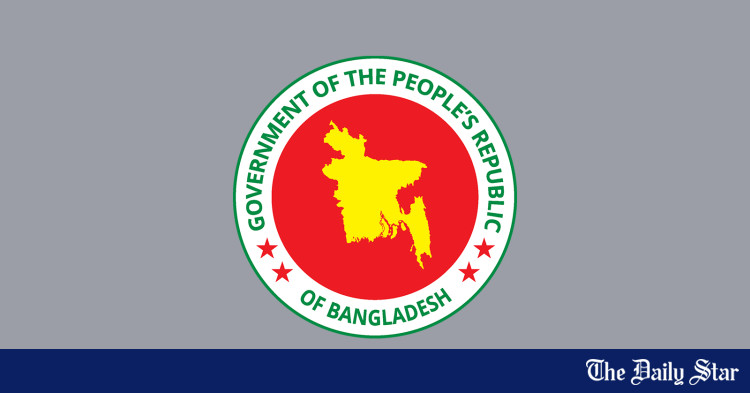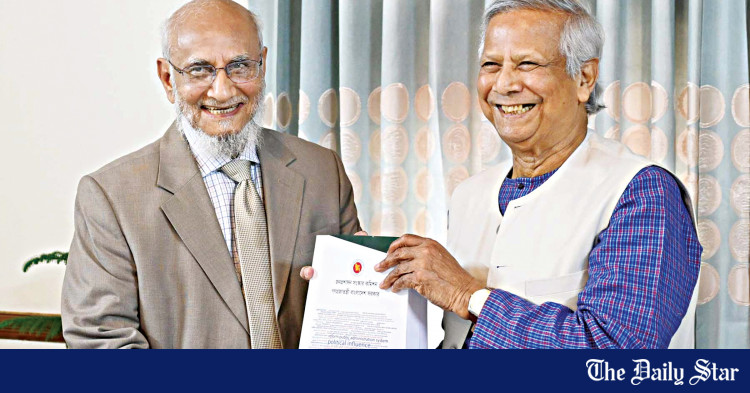Saif
Senior Member
- Messages
- 17,481
- Likes
- 8,438
- Nation

- Residence

- Axis Group


Public admin reforms: Cluster system may be proposed for ministries
The Public Administration Reform Commission is likely to recommend reducing the number of ministries and divisions to 30 from 55 to improve coordination and slash the government’s operational cost.
Public admin reforms: Cluster system may be proposed for ministries
Commission likely to suggest reducing number of ministries, divs to 30 from 55

The Public Administration Reform Commission is likely to recommend reducing the number of ministries and divisions to 30 from 55 to improve coordination and slash the government's operational cost.
It may also propose allowing political appointments for personal secretaries (PS) to the prime minister, ministers, the Speaker, and other senior policymakers in the government.
Led by Abdul Muyeed Chowdhury, the reform commission is deliberating whether to suggest the introduction of clusters of ministries and designating officials of certain cadres to a particular cluster.
Besides, proposals to divide the country into four administrative provinces and upgrading the standard of Bangladesh Civil Service exam questions are expected, said sources with knowledge of the matter.
The commission is expected to submit its recommendations on January 31 with a view to building a pro-people, accountable, skilled, and neutral public administration.
CLUSTER SYSTEM
The reform commission is planning to recommend five or six clusters of ministries and divisions where officers of certain cadres would be working, said the sources.
For example, a cluster focused on food security may include ministries like agriculture, food, environment, fisheries and livestock, and disaster management.
Officers appointed to these ministries would rotate and work across these ministries and departments, they added.
Sources in the public administration ministry said a similar cluster system was recommended by the last reform commission in 2000, and a draft policy for activities of the clusters was also prepared in 2013.
However, some influential officials from the admin cadre prevented its implementation, the sources claimed.
"If the cluster system is introduced, admin cadre officers will no longer have the same level of control over various ministries as they have now. This is why the system was not implemented," said an official from the cabinet division.
FEWER MINISTRIES, DIVISIONS
The reform commission is considering a proposal to bring down the number of ministries and divisions to 30. It could be even between 25 and 28, said a source.
If approved, this will bring down the operational cost and help coordination, the source said.
Currently, the government has 55 ministries and divisions. The interim government has already decided to merge two divisions at the home ministry.
Several officials said they believe it could be a good move since some ministries and divisions do not have much workload and could be merged.
Asked about the possible impact of this, public administration expert Firoz Mia told this newspaper, "If experienced politicians and a skilled bureaucracy work together, cutting down the number of ministries would not be a problem.
"However, under the current circumstances, it may disrupt public services."
He added that introducing such changes would first require forming a team of skilled individuals.
PROMOTION TO DS
The reform commission is considering a new promotion policy for the position of deputy secretary -- a 50:50 split between the admin and the other cadres.
Currently, 75 percent of the promotions are made from admin cadre officers and the remaining 25 percent from the other cadres.
This notion elicited a strong reaction from the administration cadre officers. Many of them are lobbying intensely to have the proposal changed.
Sources in the commission said most of the members support a merit-based, 100 percent exam-driven promotion system for the position of deputy secretary. The exams would be open to officers from all cadres.
However, the commission chairman was in favour of keeping 50 percent of the spots for admin cadre officials, the sources said.
APPOINTMENTS OF PS
Officials from the administration cadre are generally appointed as the PS to government high-ups. However, when governments change, they often face setbacks, including delays in promotions or being made officers on special duty (OSD), considered a punishment, said sources.
Last month, a BNP committee on public administration reforms, formed to come up with the party's stance before the commission, proposed appointing non-civil servants as PS to ministers.
The committee submitted the report to the reform commission on December 9.
Ismail Zabiullah, a member of the committee, said many officers who serve as PS to ministers are competent but often get accused of becoming biased towards a party.
"Therefore, we have proposed appointing officers from outside the cadres for these positions," said Ismail, also a former secretary.
The Daily Star contacted the reform commission chief and four other members, but they declined to comment.
FOUR PROVINCES
The commission may propose dividing the country into four administrative provinces. The commission's chairman verbally communicated this proposal to the government, but details could not be known, sources said.
The provinces -- Dhaka, Chattogram, Rajshahi, and Khulna -- could be made out of a broader strategy to ensure decentralisation, the sources said.
The commission members believe the current local government system is not functioning effectively. To bring about fundamental changes to local governance, the provincial system would be good, they said.
CHANGES IN BCS EXAMS
The reform commission is set to suggest significant changes to the BCS exam questions.
According to sources, the commission views that the standard of the questions is not at a satisfactory level. "The standard is at the SSC-level. It has to be upgraded," said an official involved with the commission.
Sources said measures would be taken so that candidates totally relying on guidebooks don't get the coveted jobs.
EMPLOYEES' ASSOCIATION
The commission is thinking whether to allow government employees to form associations. This issue was discussed at one of the commission's meetings, but no decision has been made so far.
Some commission members think the employees can form associations for their welfare only.
However, other members think that the association could evolve into something resembling a CBA (Collective Bargaining Agent).
A decision on the matter will be made soon, said an official.
Commission likely to suggest reducing number of ministries, divs to 30 from 55
The Public Administration Reform Commission is likely to recommend reducing the number of ministries and divisions to 30 from 55 to improve coordination and slash the government's operational cost.
It may also propose allowing political appointments for personal secretaries (PS) to the prime minister, ministers, the Speaker, and other senior policymakers in the government.
Led by Abdul Muyeed Chowdhury, the reform commission is deliberating whether to suggest the introduction of clusters of ministries and designating officials of certain cadres to a particular cluster.
Besides, proposals to divide the country into four administrative provinces and upgrading the standard of Bangladesh Civil Service exam questions are expected, said sources with knowledge of the matter.
The commission is expected to submit its recommendations on January 31 with a view to building a pro-people, accountable, skilled, and neutral public administration.
CLUSTER SYSTEM
The reform commission is planning to recommend five or six clusters of ministries and divisions where officers of certain cadres would be working, said the sources.
For example, a cluster focused on food security may include ministries like agriculture, food, environment, fisheries and livestock, and disaster management.
Officers appointed to these ministries would rotate and work across these ministries and departments, they added.
Sources in the public administration ministry said a similar cluster system was recommended by the last reform commission in 2000, and a draft policy for activities of the clusters was also prepared in 2013.
However, some influential officials from the admin cadre prevented its implementation, the sources claimed.
"If the cluster system is introduced, admin cadre officers will no longer have the same level of control over various ministries as they have now. This is why the system was not implemented," said an official from the cabinet division.
FEWER MINISTRIES, DIVISIONS
The reform commission is considering a proposal to bring down the number of ministries and divisions to 30. It could be even between 25 and 28, said a source.
If approved, this will bring down the operational cost and help coordination, the source said.
Currently, the government has 55 ministries and divisions. The interim government has already decided to merge two divisions at the home ministry.
Several officials said they believe it could be a good move since some ministries and divisions do not have much workload and could be merged.
Asked about the possible impact of this, public administration expert Firoz Mia told this newspaper, "If experienced politicians and a skilled bureaucracy work together, cutting down the number of ministries would not be a problem.
"However, under the current circumstances, it may disrupt public services."
He added that introducing such changes would first require forming a team of skilled individuals.
PROMOTION TO DS
The reform commission is considering a new promotion policy for the position of deputy secretary -- a 50:50 split between the admin and the other cadres.
Currently, 75 percent of the promotions are made from admin cadre officers and the remaining 25 percent from the other cadres.
This notion elicited a strong reaction from the administration cadre officers. Many of them are lobbying intensely to have the proposal changed.
Sources in the commission said most of the members support a merit-based, 100 percent exam-driven promotion system for the position of deputy secretary. The exams would be open to officers from all cadres.
However, the commission chairman was in favour of keeping 50 percent of the spots for admin cadre officials, the sources said.
APPOINTMENTS OF PS
Officials from the administration cadre are generally appointed as the PS to government high-ups. However, when governments change, they often face setbacks, including delays in promotions or being made officers on special duty (OSD), considered a punishment, said sources.
Last month, a BNP committee on public administration reforms, formed to come up with the party's stance before the commission, proposed appointing non-civil servants as PS to ministers.
The committee submitted the report to the reform commission on December 9.
Ismail Zabiullah, a member of the committee, said many officers who serve as PS to ministers are competent but often get accused of becoming biased towards a party.
"Therefore, we have proposed appointing officers from outside the cadres for these positions," said Ismail, also a former secretary.
The Daily Star contacted the reform commission chief and four other members, but they declined to comment.
FOUR PROVINCES
The commission may propose dividing the country into four administrative provinces. The commission's chairman verbally communicated this proposal to the government, but details could not be known, sources said.
The provinces -- Dhaka, Chattogram, Rajshahi, and Khulna -- could be made out of a broader strategy to ensure decentralisation, the sources said.
The commission members believe the current local government system is not functioning effectively. To bring about fundamental changes to local governance, the provincial system would be good, they said.
CHANGES IN BCS EXAMS
The reform commission is set to suggest significant changes to the BCS exam questions.
According to sources, the commission views that the standard of the questions is not at a satisfactory level. "The standard is at the SSC-level. It has to be upgraded," said an official involved with the commission.
Sources said measures would be taken so that candidates totally relying on guidebooks don't get the coveted jobs.
EMPLOYEES' ASSOCIATION
The commission is thinking whether to allow government employees to form associations. This issue was discussed at one of the commission's meetings, but no decision has been made so far.
Some commission members think the employees can form associations for their welfare only.
However, other members think that the association could evolve into something resembling a CBA (Collective Bargaining Agent).
A decision on the matter will be made soon, said an official.








